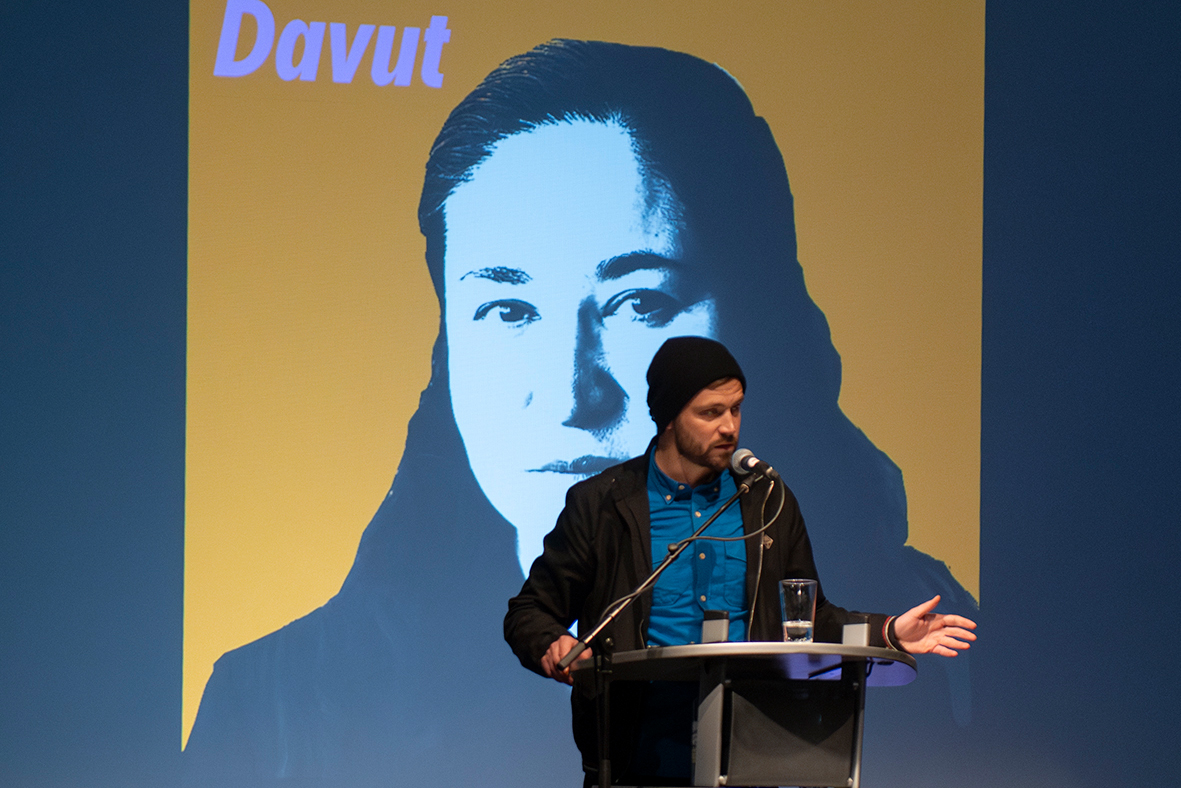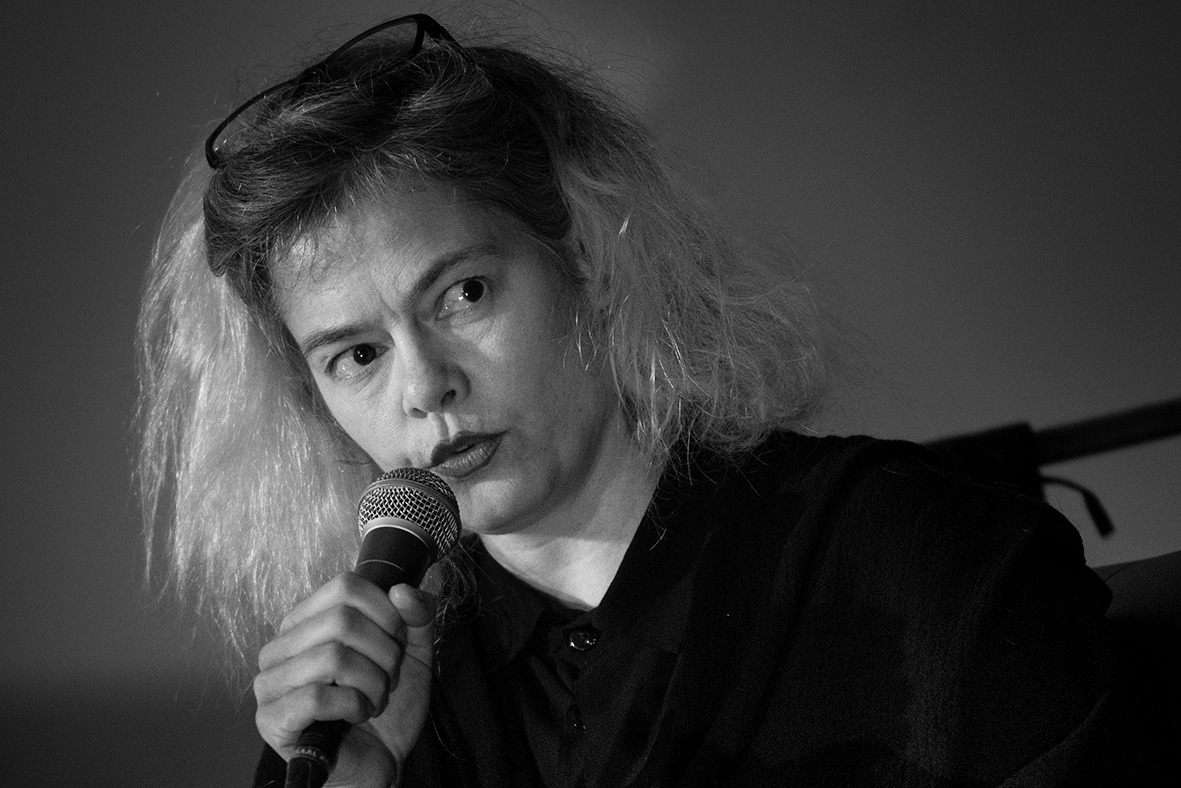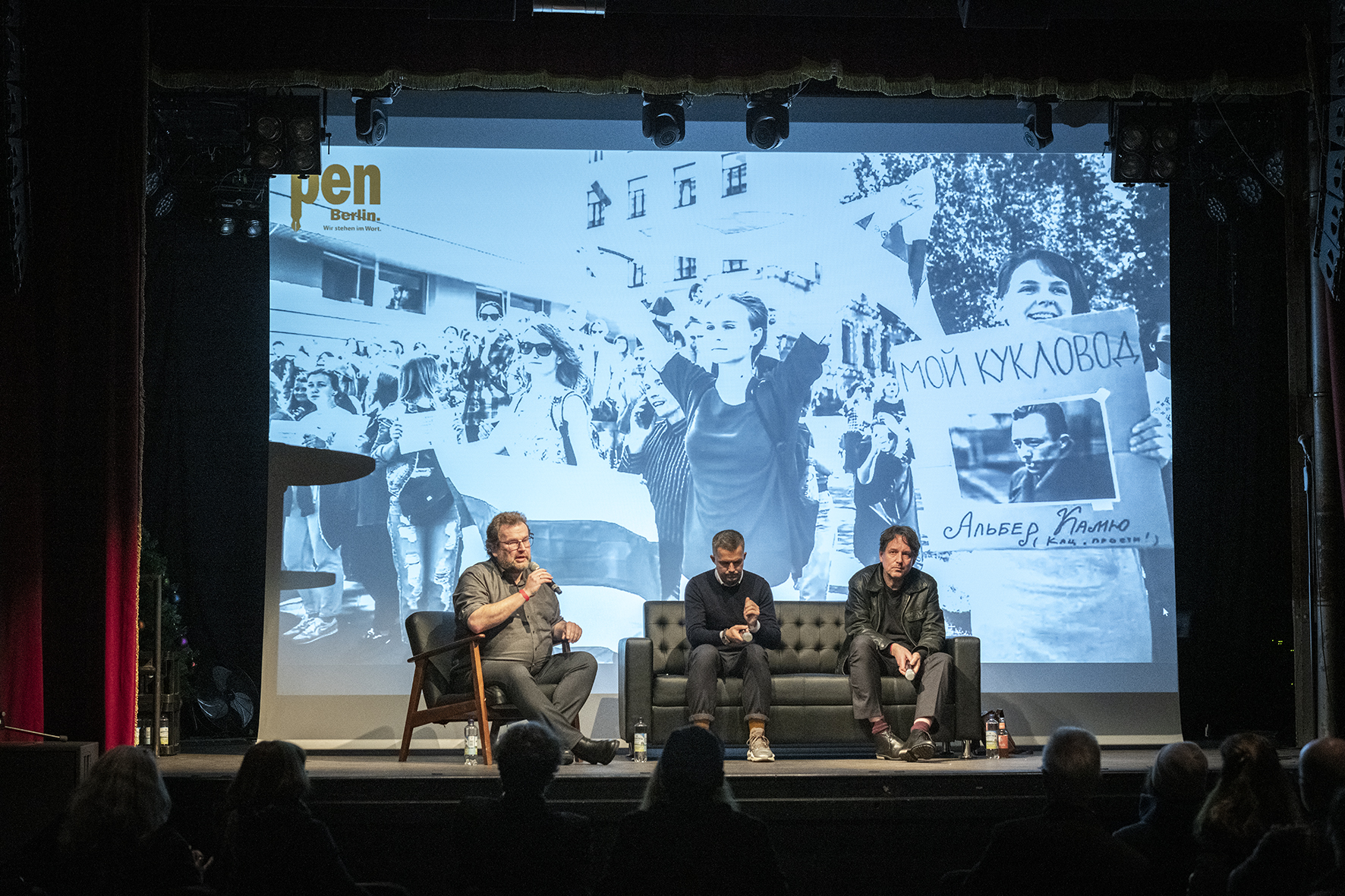Speech at the PEN Berlin Congress »With Our Heads Through The Walls«
16 December 2023, Festsaal Kreuzberg, Berlin
Still Standing for Freedom of Speech
By Ursula Krechel

Dear friends, dear guests, dear people who have come here hoping to catch a punchy headline about people butting heads –
I had a dream: In it, we spoke of freedom, and everyone meant the same freedom. I woke up – and freedom was already there, standing in the word.
Everything is in decline: political parties are losing members, churches stand frozen in horror at the sheer number of people leaving, sports clubs complain that no one wants to commit anymore, and volunteer fire brigades lament that only a few are still willing to take on voluntary roles – whether at the fire engine or in a burning house. Let others burn their fingers – or their faces.
And here we are – all volunteers, doing a job our parents warned us against. Writers who have come together of their own free will, forming working groups that try to offer protection to those in need. Branches all over the world: strong in numbers, diverse, outstanding performers. Our budget is balanced, the growth in membership remarkable – 11.4 percent within a single year, loans: absolutely none. Yes, we have lost a few members, a single-digit number, but many more – sixty-eight – were newly elected just yesterday.
In 1921, when writers – still under the shock of the First World War, which did not yet bear that name – founded an International Club, it was a sensation. The club committed itself to press freedom and pledged to combat racial, class, and national hatred. The menu of the inaugural dinner has survived. Yet it is striking that, contrary to culinary convention, potatoes were served in two courses: Pommes Savoyarde, a kind of gratin, in the fourth, and Pommes Chips with the Scottish moor grouse in the fifth. Was this already a wink towards the potato land – in the hope of reconciliation with ostracised Germany, whose literature had once shone so brightly?
In 1924, the German PEN Club was founded. Among its members were Arnold Zweig, Alfred Döblin, Ernst Toller, Ricarda Huch, Thomas and Heinrich Mann. And there they are, already posing for the photographer on the steps of Sanssouci Palace in 1926: some fifty delegates to the International PEN Congress, hosted for the first time by the Germans. The weather uncertain, in the front row to the left a gentleman with a crumpled trench coat, and to the far right a little girl wearing a rain hat, a checked coat, and strap shoes – unmistakably a tasteful writer’s child.
Poor devils, outsiders with uncertain futures

The rest is well known: the emigration of the most important authors, the founding of the PEN Club in Exile. In May 1933, at the PEN Congress in Ragusa, Ernst Toller gave a fiery speech against antisemitism and the burning of books. By then, most of the prominent PEN members had already fled Germany. Ernst Toller, Lion Feuchtwanger, and others founded the PEN Club in Exile, with Heinrich Mann as its president. They managed to organise aid for threatened writers even while they themselves were harassed and in despair. Do you think they were popular in the eyes of the world? They were poor devils, outsiders with uncertain futures – like so many of the persecuted writers we support today.
In the tentative new beginning of the German PEN after the war, Erich Kästner and Arthur Koestler on the one hand, and Johannes R. Becher on the other, played diametrically opposed roles. Then the Cold War struck – dividing and separating the systems. Yet the International PEN recognised both centres. So there have not only been two German PEN Centres for the past year and a half; there were, and still are, three. PEN in Exile remained active.
Gabriele Tergit, who from 1957 to 1981 served as secretary of what was then called the PEN Centre of German-speaking Authors Abroad, had long been forgotten as a writer – and bore it with composure. Exile had become a neutral abroad. It was not until 1980, at the annual meeting in Bremen, that exile literature took centre stage. At that time, no one could yet foresee how many writers would one day choose Germany as their country of exile.

It took an unbelievably long time for PEN East and PEN West to come together. I remember dramatic, contentious conferences. The members from the East German PEN were met with deep mistrust; people searched for and tallied up evidence of complicity, guilt, and proximity to the state. Fifty authors resigned, most of them from the West. Especially the dissidents who had been expatriated or who had left the GDR or other communist countries under dramatic circumstances understandably did not wish to share an institution with those who, along with their freedom of body and life, had also lost the freedom of expression.
These are the traditions in which PEN Berlin stands – not those of a rowdy club.
What does that mean when the world is drifting apart, when new blocs are forming, when PEN Berlin is the only institution in the German-speaking world in which writers collaborate across many languages, in which there are both Jewish and Muslim members? Listen – also argue with one another, and please read the Charter, as well as the corresponding articles of the Basic Law.
No freedom for those who deny the freedom of thought and writing

I find it utterly intolerable that, when it comes to questions of solidarity with Israel, contemporary Germans – whom I must, regardless of the individual, call by and large the children or grandchildren of perpetrators – assume the role of self-appointed moral guardians of Jewish people. Jewish scholars and writers are pathologised and psychologised, as if they were fuelling antisemitism by criticising the current policies of the Israeli government. I find it equally intolerable that researchers of antisemitism are ultimately accused of antisemitism themselves. Forgotten in all this is the long history of desecrated Jewish graves, of synagogues destroyed after 1945 to make room for car parks and department stores.
No freedom for those who seek to prevent the freedom of thought and writing. And those are not only states or corporations. Sometimes it is we ourselves – out of cowardice or fatigue, self-interest, or self-censorship. In the English-speaking world, there is a different, much broader concept of freedom for political and literary expression, and from there we often appear historically inhibited by our own past. For us, it is unbearable to relativise the suffering we inflicted upon Jewish people. In Australia, understandably, things look a little different – after the disenfranchisement of the Aboriginal people.
I have a dream: there are small fishing boats, filled with desperate people – many women and children boarding them off the southern coast of Palestine. They are, beyond doubt, war refugees.
I have a dream: bread falls from the sky – the bread once called manna, which nourished the Israelites during their forty years of wandering in the desert. Water falls from the sky – water of drinking quality. Or was it that Moses struck it from the rock and, millennia later, magnanimously gave it to Muslims to drink?
Martin Luther King had a dream, and he spoke of it in psalm-like cadence, without polemics, on the steps of the Lincoln Memorial before 250,000 people – the dream of a just country, without racism. His dream, and the public dreamer himself, were murdered.
* Ursula Krechel, born in 1947, writer, Vice President of the Academy of Sciences and Literature Mainz, and former Honorary President of PEN Germany (Darmstadt). Her most recent book: »Gehen. Träumen. Sehen. Unter Bäumen. Essays« (Jung und Jung
ALL SPEECHES AT THE CONGRESS »WITH OUR HEAD THROUGH THE WALLS«
